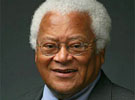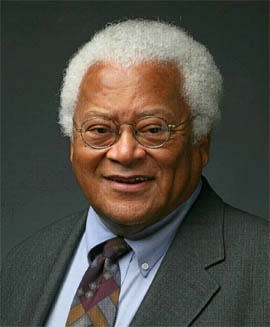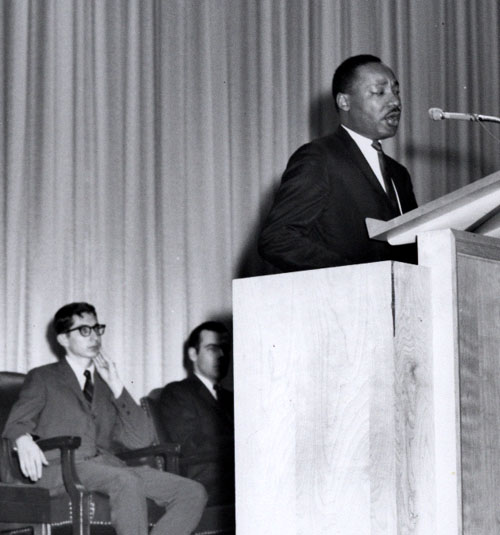Civil Rights legend Rev. James Lawson
joins social justice scholars at SMU on Sept. 6
Legandary activist James Lawson will lead a discussion on the future of civil rights on Sept. 6.

DALLAS (SMU) — On the heels of the 50th anniversary of Rev. Martin Luther King, Jr.’s “I Have a Dream” speech and the March on Washington, renowned civil rights and social justice leaders and scholars will be at SMU to discuss the future.
“The End of Civil Rights in America? Reflections on the Future of Economic Justice from the Perspectives of Law and Religion” is Friday, Sept. 6, from 9 a.m. to 4 p.m. in Karcher Auditorium, SMU Dedman School of Law Storey Hall, 3315 Daniel Ave.
Sponsored by SMU’s Perkins School of Theology and Dedman School of Law, the daylong symposium will focus on efforts to overcome economic injustices tied to racial inequality, and examine what work still needs to be done.

This event is open to the public and a $20 per person cost covers lunch and parking (waived for SMU students, staff and faculty). Registration is required and seating is limited. To register, contact Lisa Montes at lmontes@smu.edu and include a name,
e-mail address and phone number.
In 1960, after studying satyagraha (the methods of Mohandas Gandhi) in India, Lawson helped found the Student Nonviolent Coordinating Committee, which played a leading role in the March on Washington and other major civil rights events. As a third-generation Methodist minister in Memphis, Lawson also chaired the strike committee of African-American sanitation workers, who organized for higher wages and union recognition in 1968 after two workers were crushed to death in the course of their jobs. King was in Memphis to offer support to the strikers when he was assassinated.
Lawson continues to be active in practicing, teaching and training for nonviolent resistance, and helps support many civil rights and social justice initiatives.
Symposium speakers and their presentations (with question-and-answer time) include:
- Willie Baptist, Union Theological Seminary Poverty Initiative scholar-in-residence
in New York City: “Reigniting Martin Luther King’s Poor People’s Campaign Today: From Civil Rights to Human Rights” - Jim Harrington, Austin attorney, founder-director of Texas Civil Rights Project
and adjunct University of Texas School of Law instructor: “Private Actions to Enforce Civil Rights Laws” - John Martin, Dallas attorney: “Government Enforcement of Voting Rights Laws”
- Evelyn L. Parker, SMU Perkins School of Theology associate dean for academic
affairs and professor of practical theology: “Young Women and the Struggle for Economic Justice: A Litany of Issues” - Joerg Rieger, Perkins School of Theology Wendland-Cook Professor of
Constructive Theology: “Why Both Race and Class Matter in Religion: Taking the Long View” - Eliot Shavin, attorney and SMU Dedman School of Law lecturer: “Wealth as a Suspect Classification and The Economic Bill of Rights”
- Theodore Walker, Jr., SMU Perkins School of Theology associate professor
of ethics and society: “Beyond Civil Rights to Economic Rights: Prescriptions from the Rev. Martin Luther King, Jr.”
For more details, including the symposium’s complete schedule, visit:
www.smu.edu/Perkins/News/News_Archives/Archives%202013/End_of_Civil_Rights
or
www.law.smu.edu/Events/Alumni/The-End-of-Civil-Rights-in-America--Reflections-on.aspx.
SMU celebrates 50th anniversary
of the 'March on Washington'
To commemorate the 50th anniversary of the Aug. 28,1963, March On Washington, SMU students gathered to watch televised anniversary march ceremonies and a debate on the progress of Martin Luther King, Jr.’s dream with Wiley College students.
Live streaming of ceremonies marking the 50th anniversary of the March On Washington were provided throughout the day in the Hughes-Trigg Student Center. Students were encouraged to write comments on a life-size poster regarding what MLK’s dream will mean 50 years from now.
In addition, SMU’s debate team conducted a public debate with Wiley College on the question of whether America is advancing on King’s dream in 2013. The event featured readings from Martin Luther King, Jr.’s “I Have A Dream” speech and from a letter by the ‘great debater’ James Farmer, Jr., a key civil rights leader from Texas.
SMU students' watch anniversary events |
 Rev. Dr. Martin Luther King Jr. at SMU on March 17, 1966 |
# # #